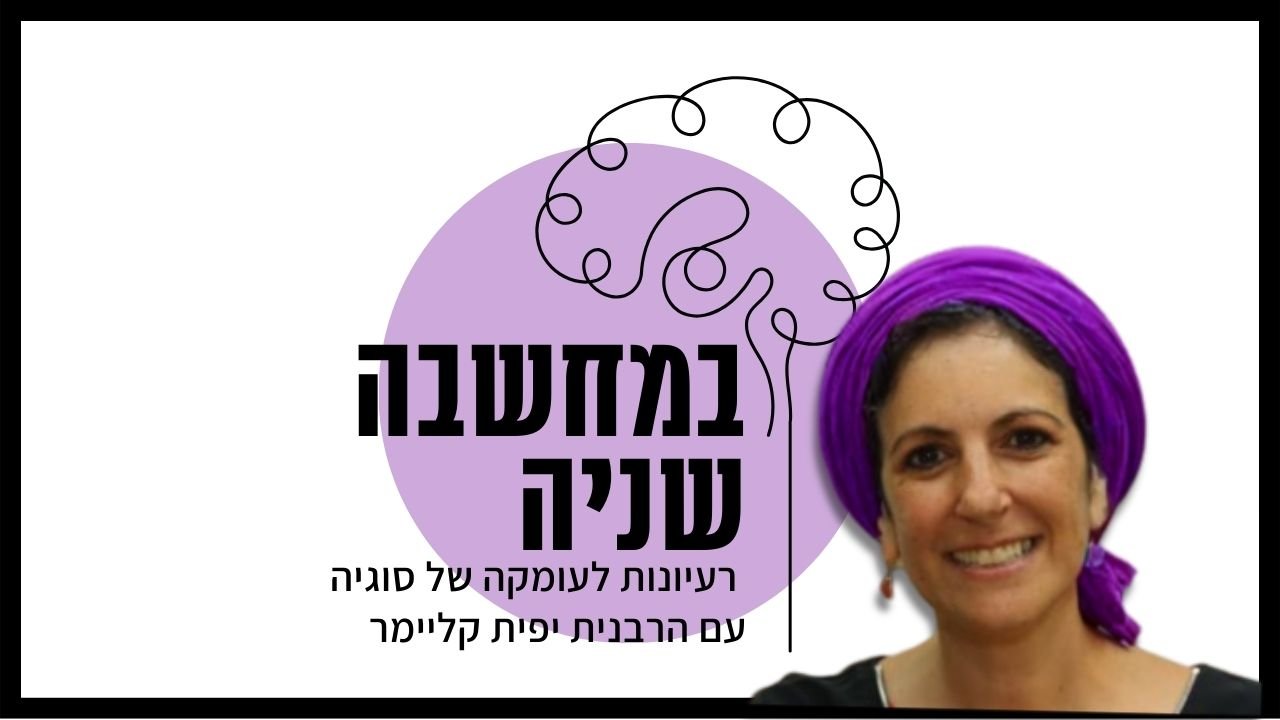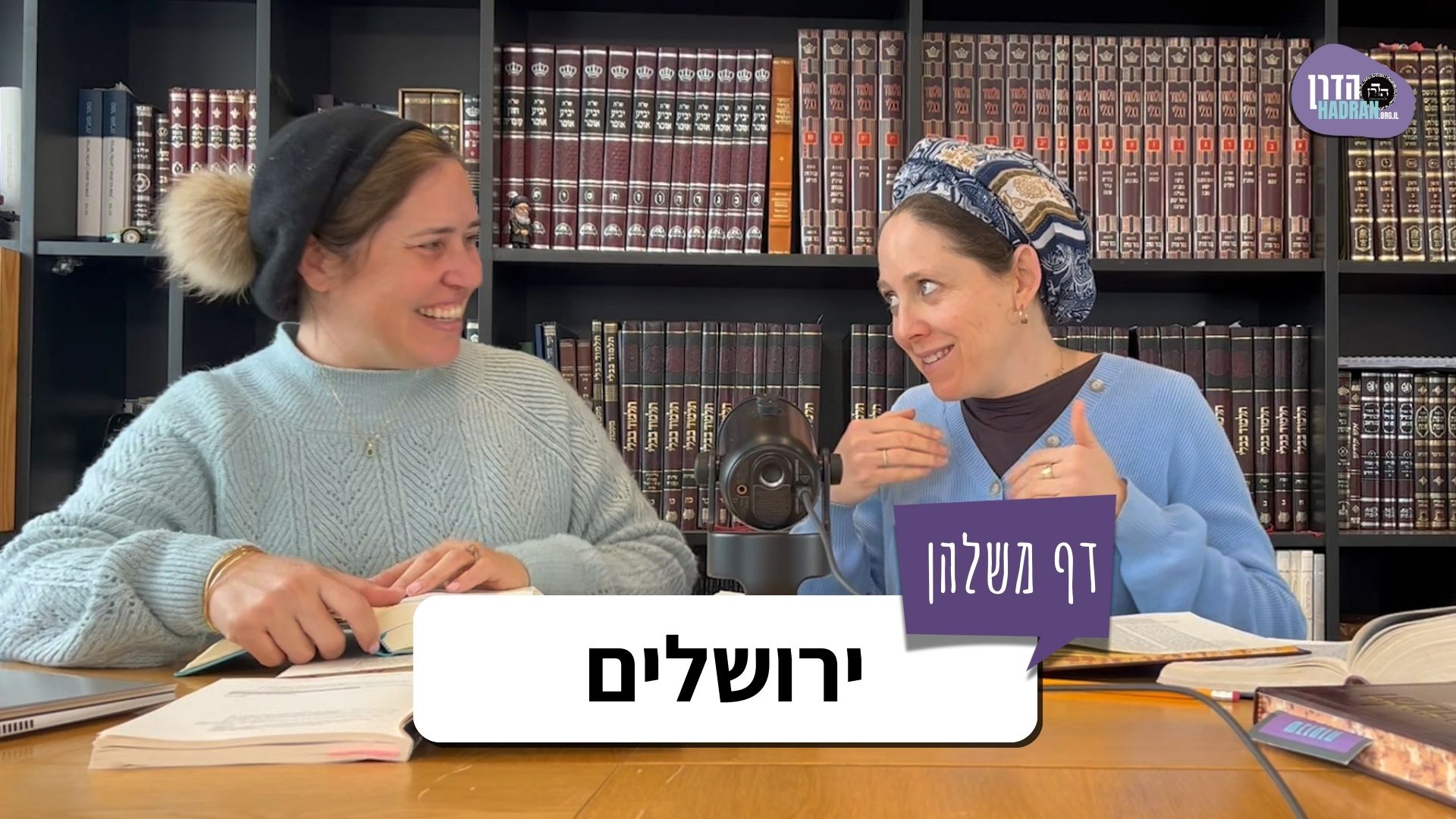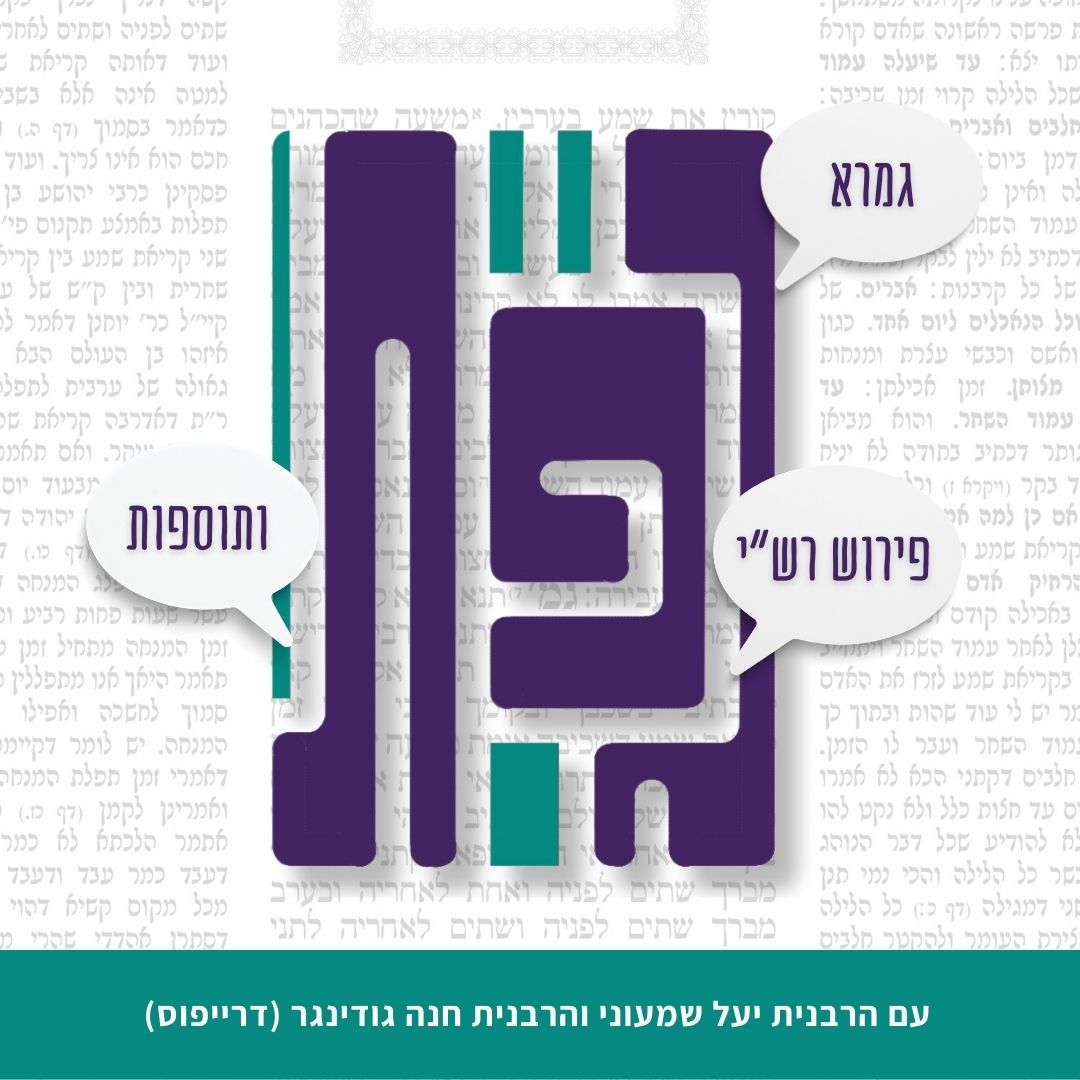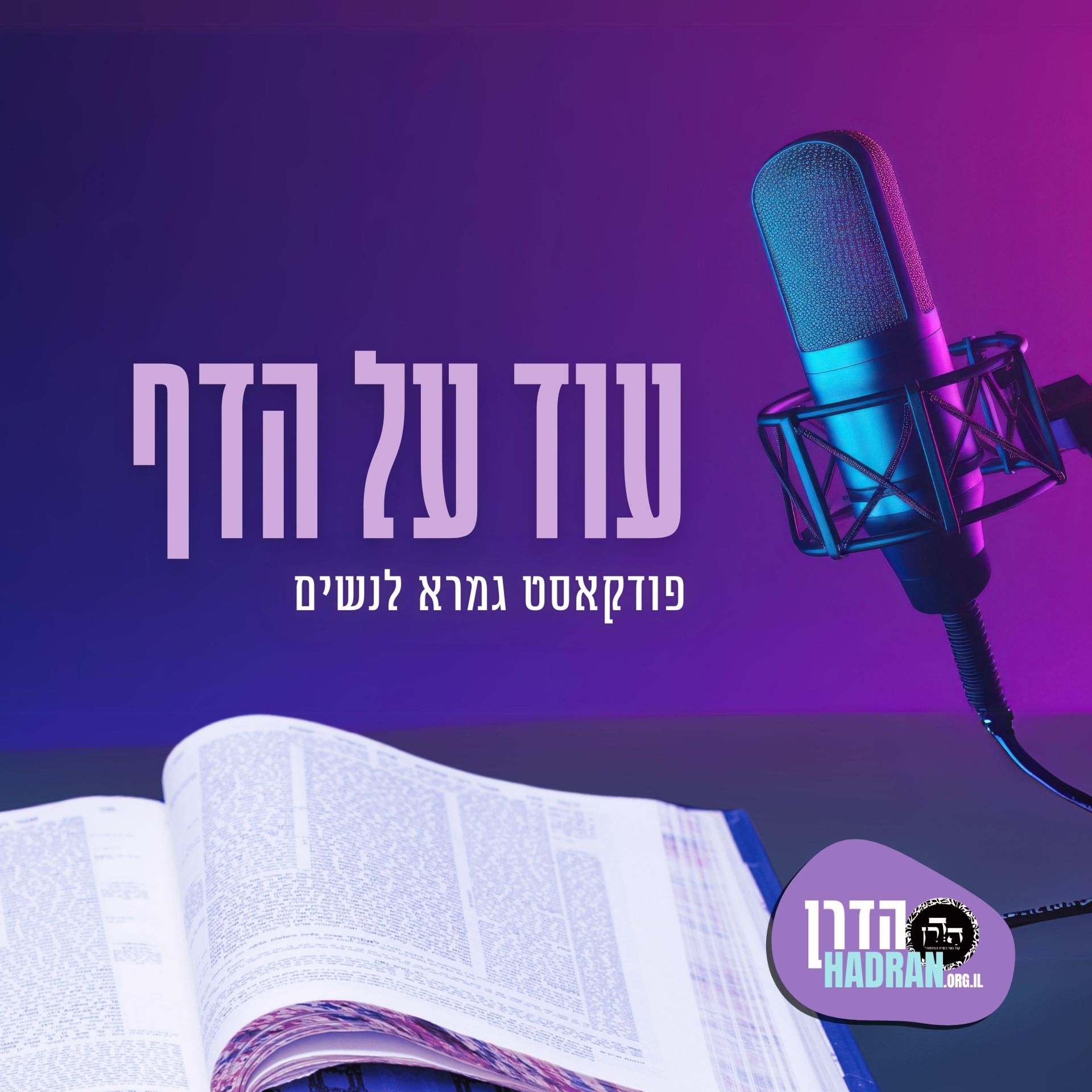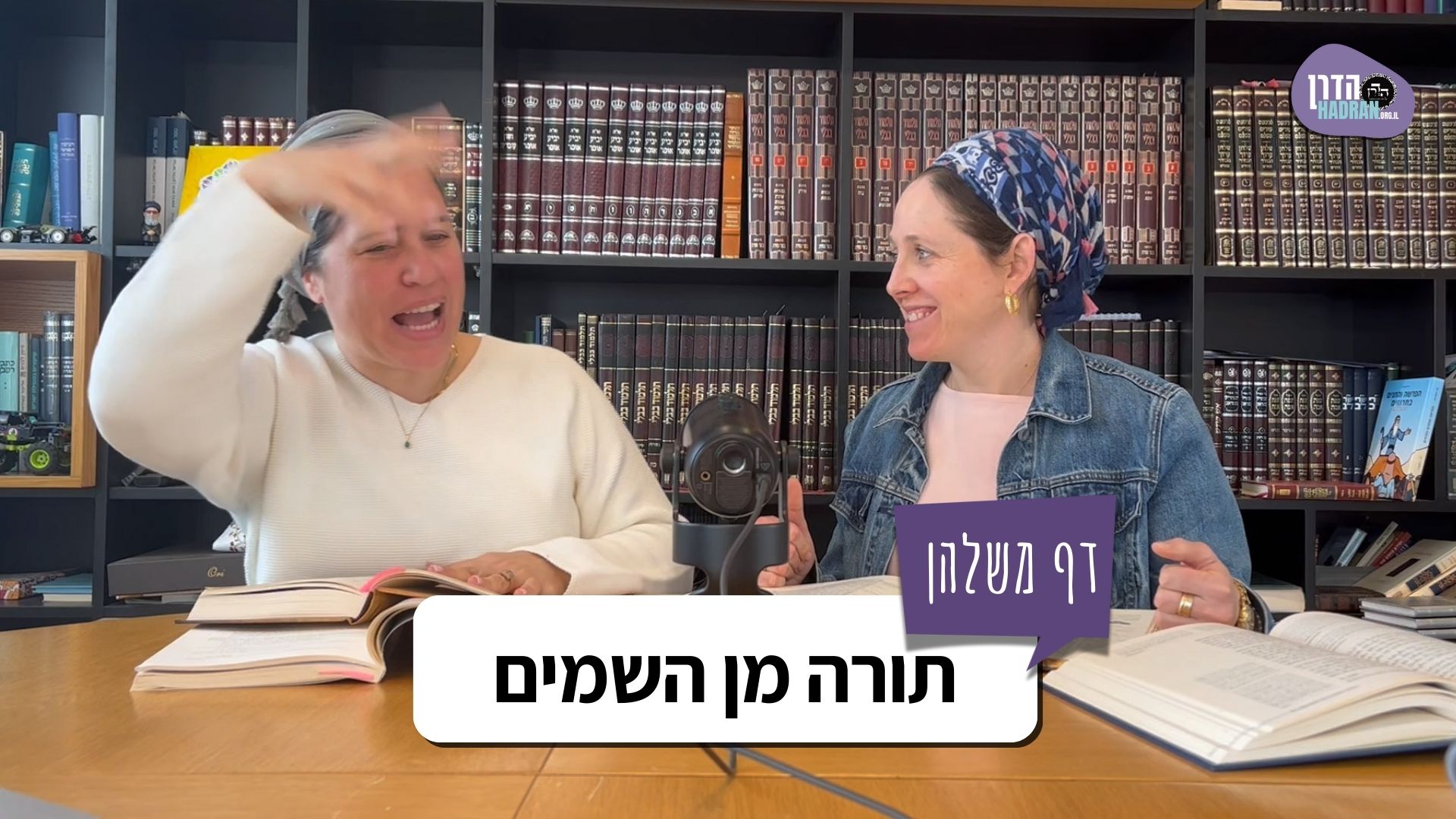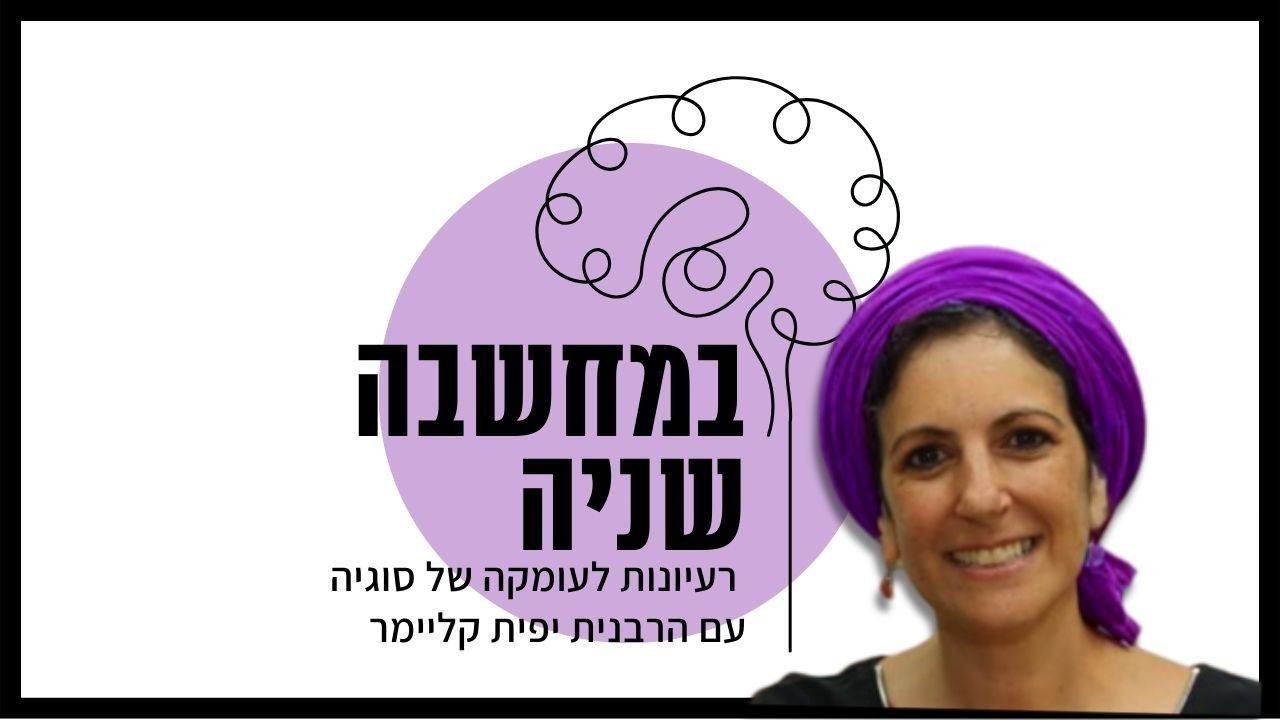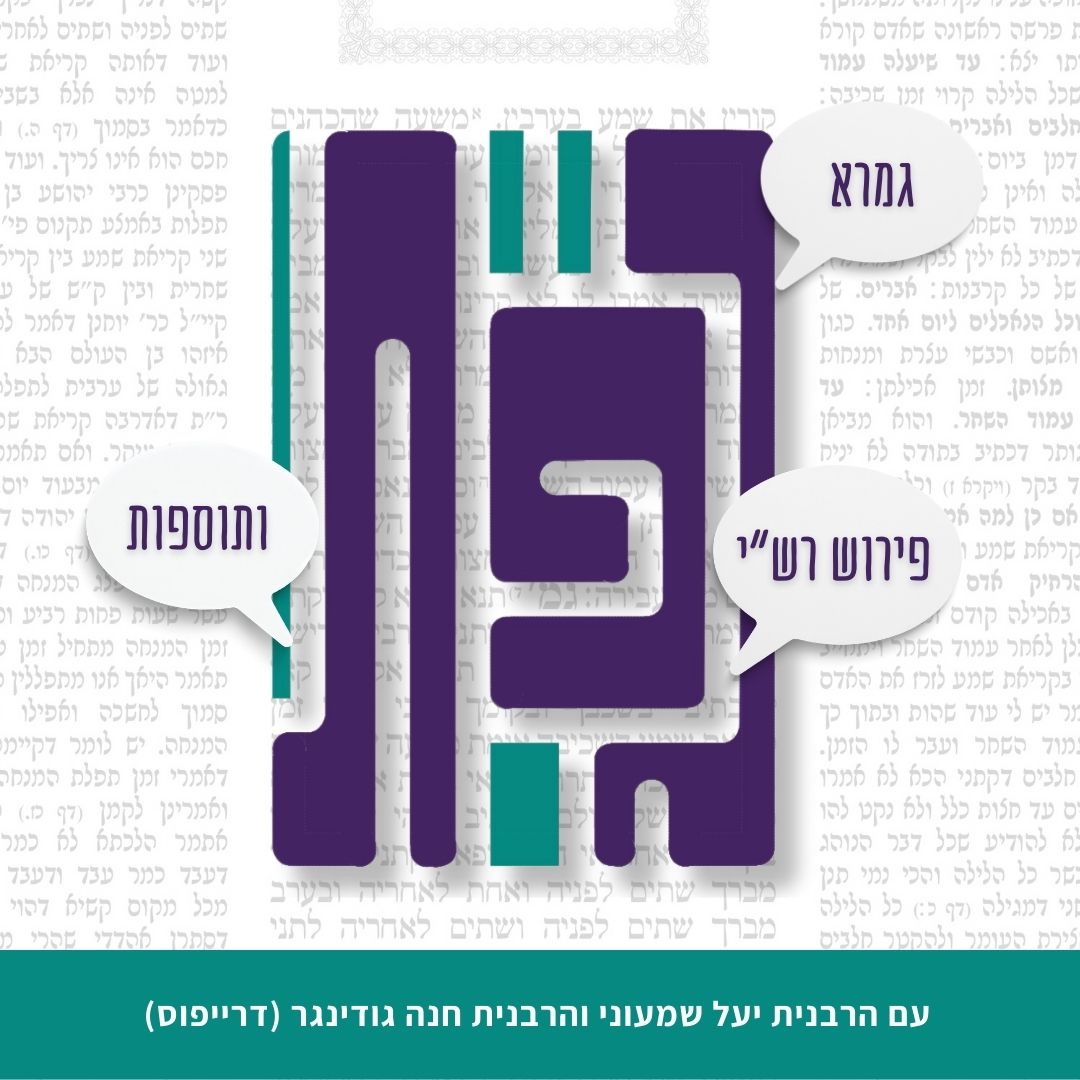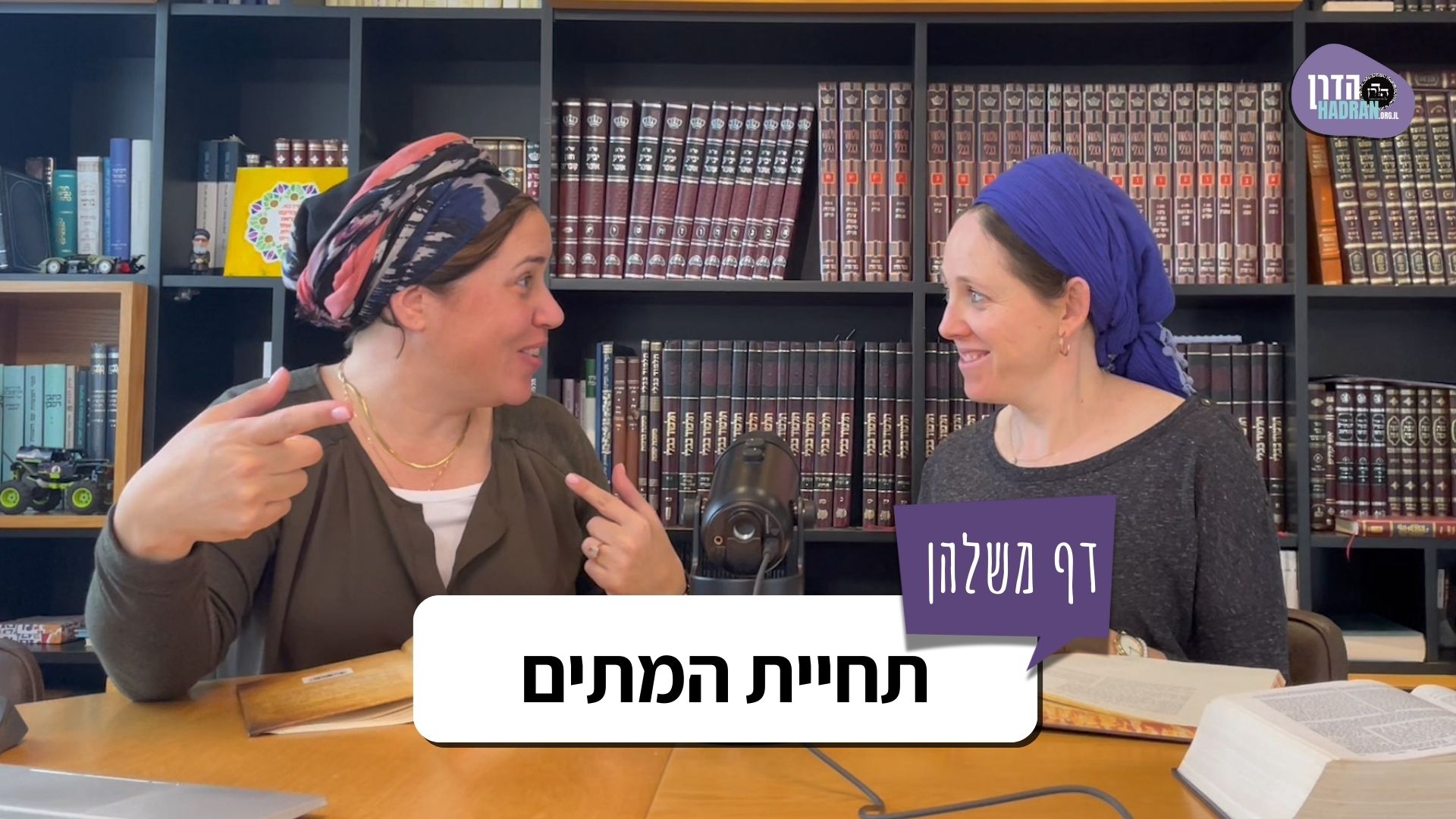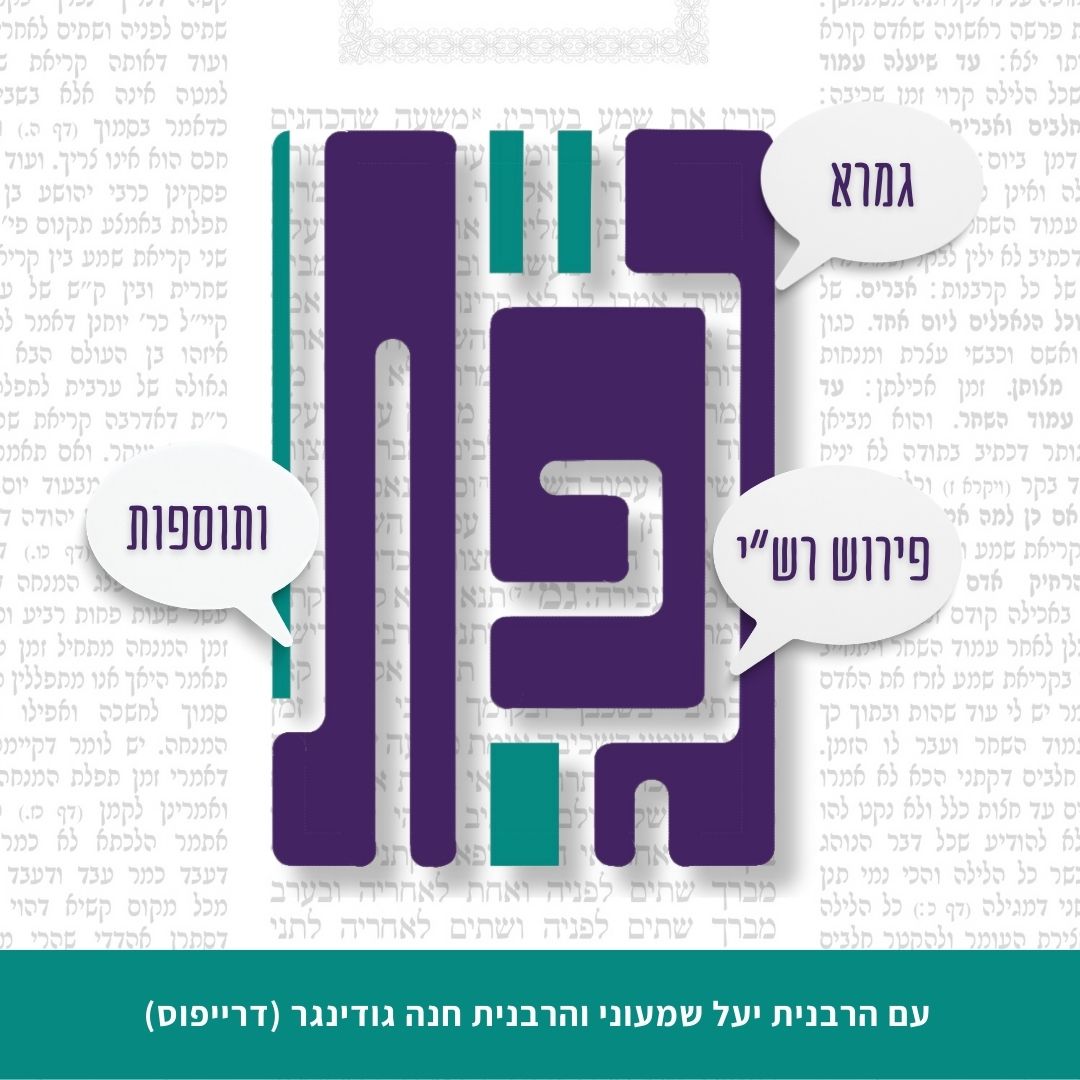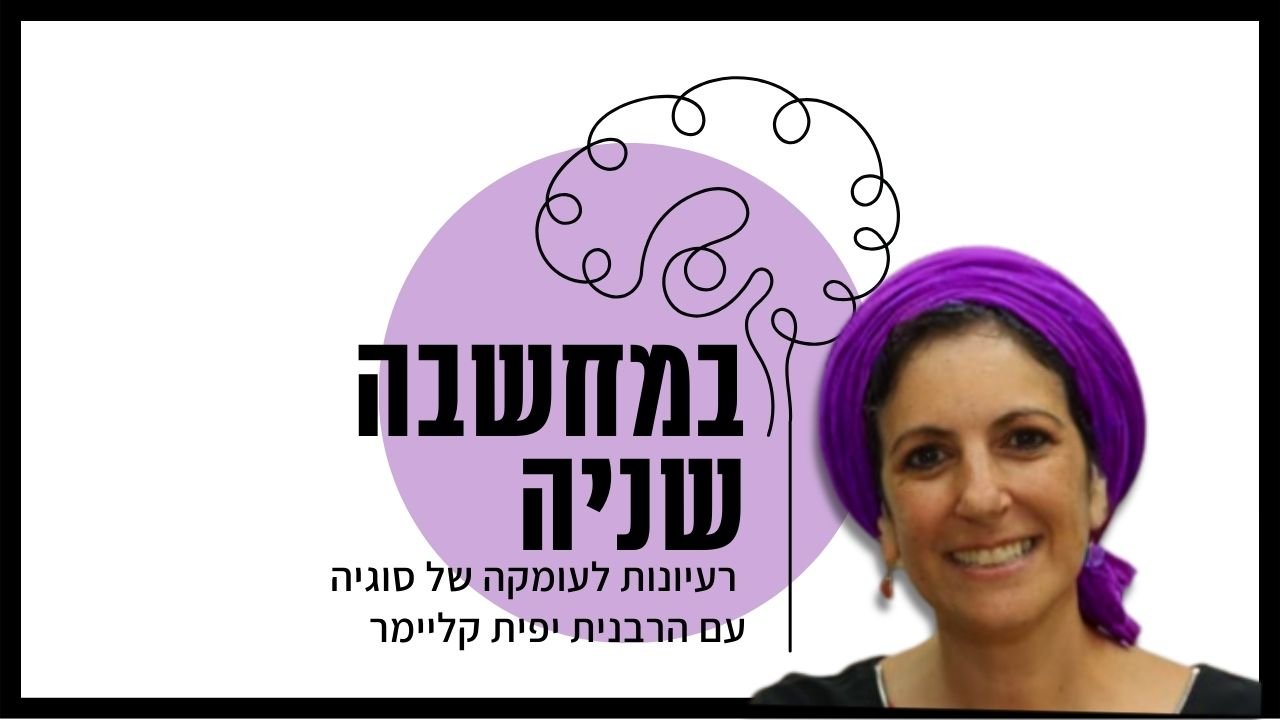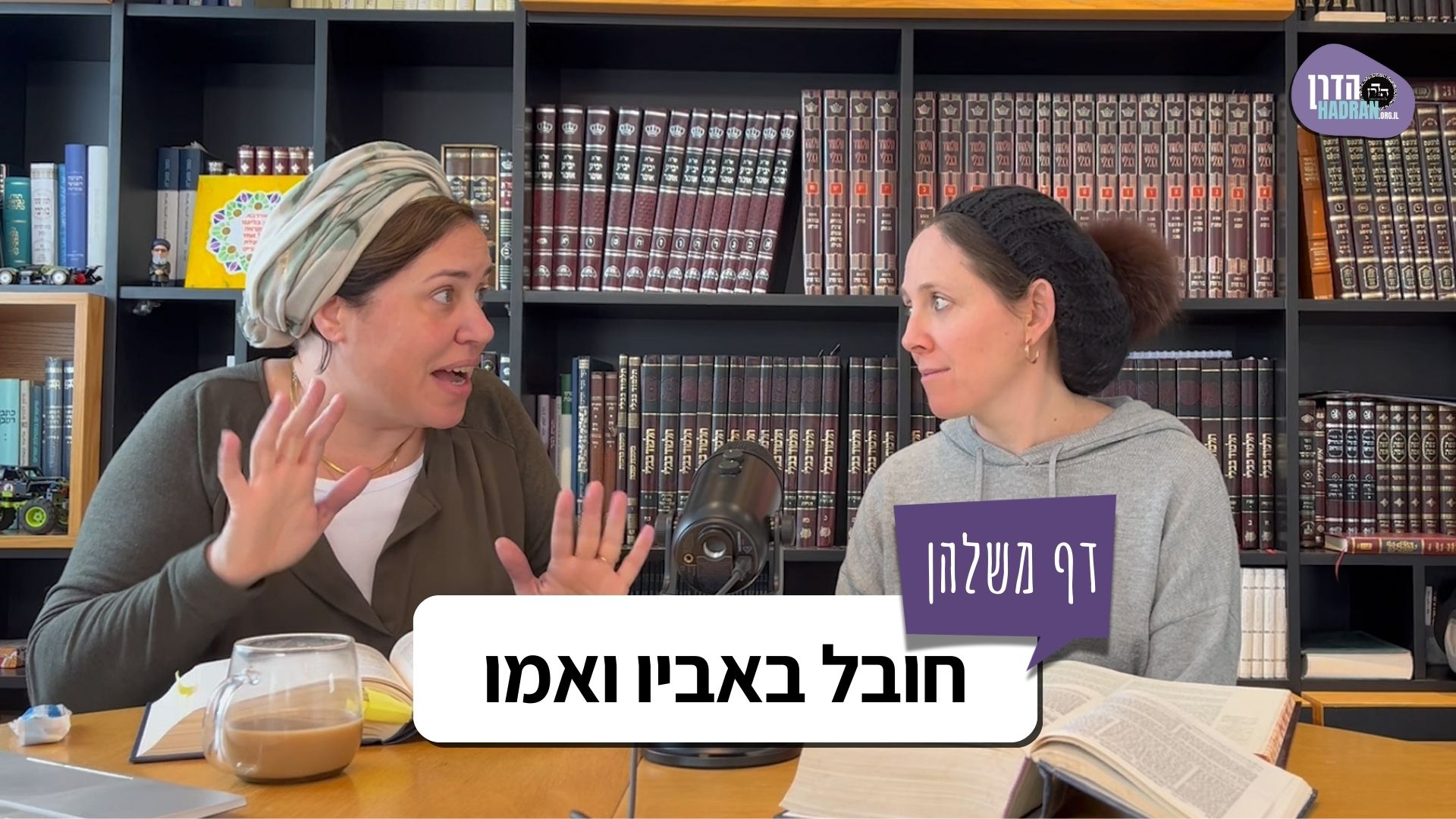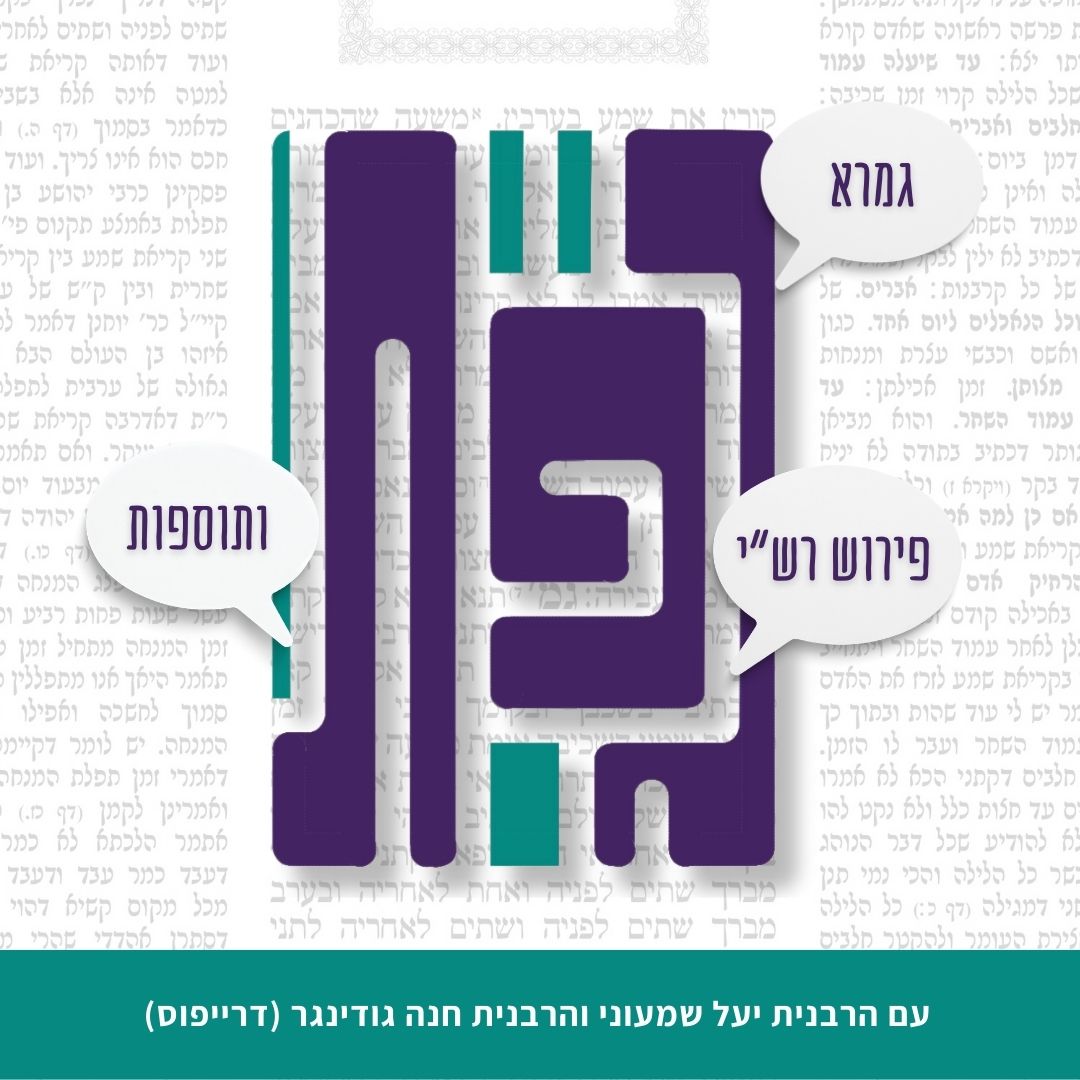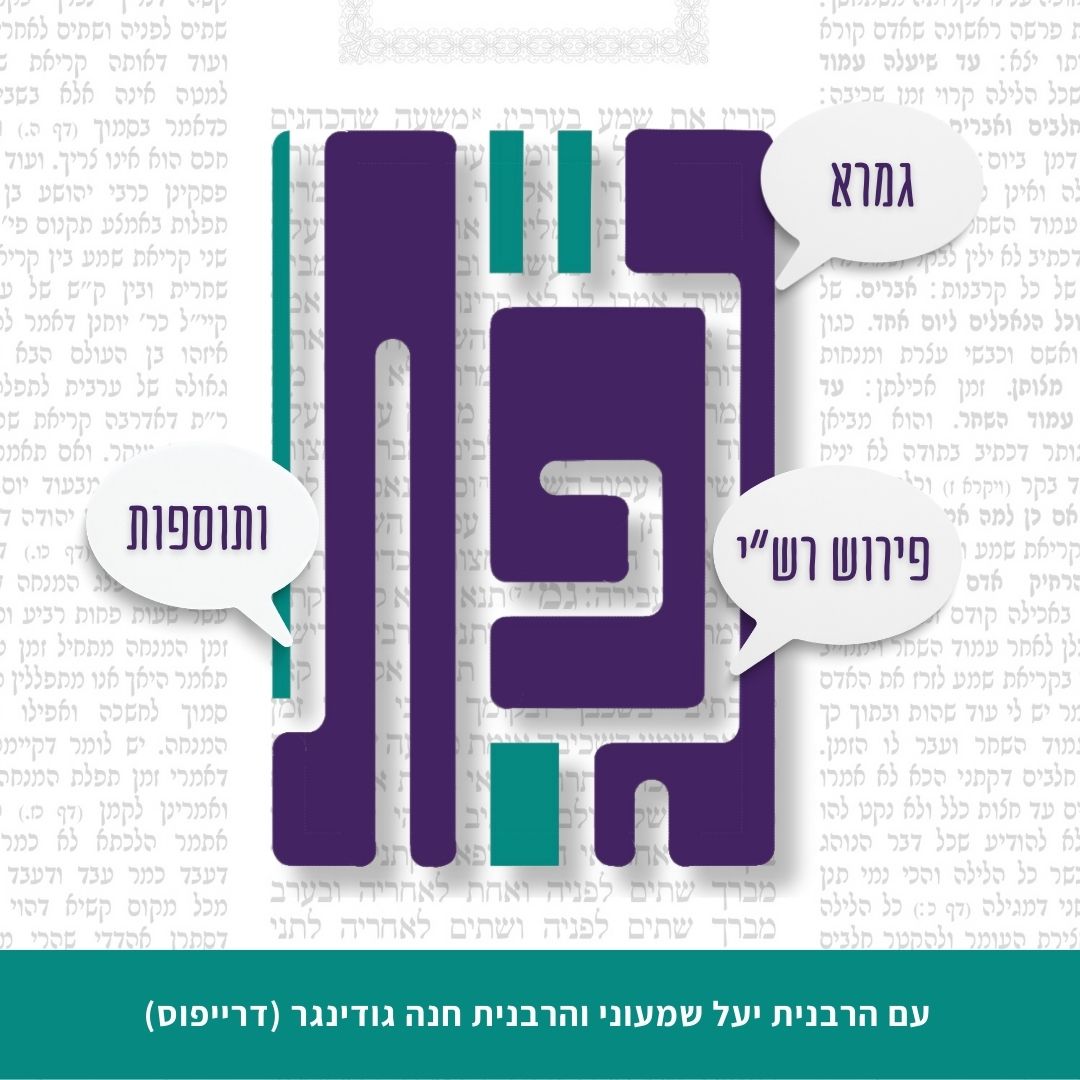סנהדרין פה
וְרַבִּי שִׁמְעוֹן הָאָמַר: כׇּל מְלָאכָה שֶׁאֵינָהּ צְרִיכָה לְגוּפָהּ – פָּטוּר עָלֶיהָ.
and doesn’t Rabbi Shimon say: With regard to one who performs any prohibited labor that is not necessary for its own sake, it is labor for which he is exempt? In this case, causing the wound was inadvertent and was not his objective when performing the action.
בְּעוֹ מִינֵּיהּ מֵרַב שֵׁשֶׁת: בֵּן מַהוּ שֶׁיֵּעָשֶׂה שָׁלִיחַ לְאָבִיו, לְהַכּוֹתוֹ וּלְקַלְלוֹ?
§ The Sages raised a dilemma before Rav Sheshet: What is the halakha with regard to whether a son may be designated an agent of the court in order to flog his father or to curse him if the court sentenced him to ostracism?
אֲמַר לְהוּ: וְאַחֵר מִי הִתִּירוֹ? אֶלָּא, כְּבוֹד שָׁמַיִם עָדִיף. הָכָא נָמֵי, כְּבוֹד שָׁמַיִם עָדִיף.
Rav Sheshet said to them: And did the Torah render it permitted to flog or curse another who is not his father? The Torah prohibited such actions. Rather, the reason that an agent of the court may flog or curse the one found liable is that the honor of Heaven takes precedence over the honor due to another. Here too, a son may serve as an agent of the court because the honor of Heaven takes precedence over the honor due to his father.
מֵיתִיבִי: וּמָה מִי שֶׁמִּצְוָה לְהַכּוֹתוֹ, מִצְוָה שֶׁלֹּא לְהַכּוֹתוֹ; מִי שֶׁאֵינוֹ מִצְוָה לְהַכּוֹתוֹ, אֵינוֹ דִּין שֶׁמִּצְוָה שֶׁלֹּא לְהַכּוֹתוֹ?
The Gemara raises an objection from a baraita: And just as with regard to one who is commanded to strike him there is a mitzva not to strike him under other circumstances, with regard to one who is not commanded to strike him is it not right that there is a mitzva not to strike him?
מַאי לָאו אִידֵּי וְאִידֵּי בִּמְקוֹם מִצְוָה? הָא – בִּבְנוֹ, הָא – בְּאַחֵר.
The Gemara explains the baraita: What, is it not that both this first clause of the statement of the baraita and that latter clause of the statement of the baraita are referring to a situation where striking another is a mitzva, e.g., where the other is liable to receive lashes. The distinction between them is that this latter clause, which is referring to one who is not commanded to strike him, is concerning a case where the agent is his son and is therefore prohibited from striking his father even in that capacity, while that first clause, which is referring to one who is commanded to strike him, is concerning a case where the agent is another individual and not his son. This indicates that it is prohibited for a son to flog his father as an agent of the court.
לָא, אִידֵּי וְאִידִי לָא שְׁנָא בְּנוֹ וְלָא שְׁנָא אַחֵר. וְלָא קַשְׁיָא: כָּאן – בִּמְקוֹם מִצְוָה, כָּאן – שֶׁלֹּא בִּמְקוֹם מִצְוָה.
The Gemara answers: No, in both this clause and that clause it is no different if the agent is his son and it is no different if the agent is another. And it is not difficult to distinguish between the clauses: Here, in the first clause, the reference is to a situation where striking another is a mitzva, as he is an agent of the court; there, in the latter clause, the reference is not to a situation where striking another is a mitzva.
וְהָכִי קָתָנֵי: וּמָה בִּמְקוֹם מִצְוָה, שֶׁמִּצְוָה לְהַכּוֹתוֹ – מִצְוָה שֶׁלֹּא לְהַכּוֹתוֹ; שֶׁלֹּא בִּמְקוֹם מִצְוָה, שֶׁאֵינוֹ מִצְוָה לְהַכּוֹתוֹ – אֵינוֹ דִּין שֶׁמִּצְוָה שֶׁלֹּא לְהַכּוֹתוֹ?
And accordingly, this is what the baraita is teaching: And just as in a situation where striking another is a mitzva, where the agent of the court is commanded to strike him, there is a mitzva not to strike him even one lash beyond the number determined by the court, as it is written: “Forty lashes shall he strike him, he shall not exceed, lest if he shall exceed to strike him” (Deuteronomy 25:3), accordingly, in a situation where striking another is not a mitzva, where one is not commanded to strike him, is it not right that there is a mitzva not to strike him? The general prohibition against striking another in any situation is derived from this verse.
תָּא שְׁמַע: הַיּוֹצֵא לֵיהָרֵג וּבָא בְּנוֹ וְהִכָּהוּ וְקִילְּלוֹ – חַיָּיב, בָּא אַחֵר וְהִכָּהוּ וְקִילְּלוֹ – פָּטוּר. וְהָוֵינַן בַּהּ: מַאי שְׁנָא בְּנוֹ וּמַאי שְׁנָא אַחֵר? וְאָמַר רַב חִסְדָּא: בִּמְסָרְבִין בּוֹ לָצֵאת וְאֵינוֹ יוֹצֵא.
The Gemara suggests: Come and hear a proof from a baraita: In the case of one who emerges from the court condemned to be executed and his son came and struck him or cursed him, the son is liable to be executed for striking or cursing his father. If another came and struck him or cursed him, he is exempt. And we discussed it as follows: What is different about the case where his son strikes or curses him that he is liable, and what is different about the case where another strikes or curses him that he is exempt? And Rav Ḥisda says: The baraita is referring to a case where they are imploring the condemned man to emerge from the court to be executed but he is not emerging. Therefore, it is necessary to employ force. Apparently, even under those circumstances, where the use of force is sanctioned by the court, it is prohibited for the son to strike his father.
רַב שֵׁשֶׁת מוֹקֵי לַהּ בְּשֶׁאֵין מְסָרְבִין בּוֹ לָצֵאת.
The Gemara rejects this proof: Rav Sheshet interprets this baraita as referring to a case where they are not imploring him to emerge from the court for his execution. It is referring to a case where the condemned man is proceeding willingly, and it is not an agent of the court but someone else who strikes and curses him at his own initiative.
אִי הָכִי, אַחֵר נָמֵי? אַחֵר – גַּבְרָא קְטִילָא הוּא.
The Gemara challenges: If so, even another who strikes one who is condemned to death should be liable, as it is prohibited to strike or curse another. The Gemara responds: If another does so he is exempt, since the legal status of the one condemned to death is that of a dead man. Therefore, one is not liable for striking or humiliating him.
וְהָאָמַר רַב שֵׁשֶׁת: בִּיְּישׁוֹ יָשֵׁן וָמֵת – חַיָּיב? הָכָא בְּמַאי עָסְקִינַן? בְּשֶׁהִכָּהוּ הַכָּאָה שֶׁאֵין בָּהּ שָׁוֶה פְּרוּטָה.
The Gemara asks: But doesn’t Rav Sheshet himself say: If one humiliates another who is sleeping and the individual never awakens and dies, the one who humiliated him is liable to compensate his heirs for that humiliation? Apparently, even if the status of the condemned is that of a dead person, the one who cursed him should be liable to compensate his heirs. The Gemara answers: With what are we dealing here in the baraita? We are dealing with a case where he struck him with a blow that does not have sufficient force to cause damage worth one peruta, in which case no compensation is paid.
וְהָאָמַר רַבִּי אַמֵּי אָמַר רַבִּי יוֹחָנָן: הִכָּהוּ הַכָּאָה שֶׁאֵין בָּהּ שָׁוֶה פְּרוּטָה – לוֹקֶה? מַאי ״פָּטוּר״ דְּקָאָמַר? פָּטוּר מִמָּמוֹן.
The Gemara asks: But doesn’t Rabbi Ami say that Rabbi Yoḥanan says: In a case where one struck another with a blow that does not have sufficient force to cause damage worth one peruta, he is flogged for violating the prohibition: “He shall not exceed”? Why does the baraita exempt another entirely? The Gemara explains: What is the meaning of the term exempt that is stated in this baraita? It means that he is exempt from monetary restitution, but he is liable to receive lashes.
מִכְלָל דִּבְנוֹ חַיָּיב בְּמָמוֹן? אֶלָּא בְּדִינוֹ. הָכָא נָמֵי, בְּדִינוֹ.
The Gemara asks: If the clause of the baraita that discusses a case where another individual strikes or curses him states that he is exempt only from payment of restitution, one may conclude by inference that the clause of the baraita that discusses his son states that he is liable to pay monetary restitution. That is certainly not the case. Rather, the clause of the baraita that discusses his son states that he is liable to be punished in accordance with his appropriate sentence; here too, the clause of the baraita that discusses another individual states that he is exempt from punishment in accordance with his appropriate sentence. The question remains: Why is another exempt from receiving lashes in a case where he struck him with a blow that does not have sufficient force to cause damage worth one peruta?
אֶלָּא, אַחֵר הַיְינוּ טַעְמָא דְּפָטוּר, דְּאָמַר קְרָא: ״וְנָשִׂיא בְעַמְּךָ לֹא תָאֹר״ – בְּעוֹשֶׂה מַעֲשֵׂה עַמְּךָ.
The Gemara answers: Rather, this is the reason that another is exempt: As the verse states: “Nor curse a ruler of your people” (Exodus 22:27), from which it is inferred that this prohibition applies only with regard to one who performs an action of “your people,” i.e., an action befitting a Jew. There is no prohibition against cursing one whose actions are inconsistent with the conduct appropriate for a Jew.
הָתִינַח קְלָלָה, הַכָּאָה מְנָלַן? דְּמַקְּשִׁינַן הַכָּאָה לִקְלָלָה.
The Gemara asks: This explanation works out well with regard to cursing, as that is the prohibition mentioned in that verse. From where do we derive that the halakha is the same with regard to striking? The Gemara answers: We derive that the halakha is the same for both, as we liken striking to cursing based on the juxtaposition between the verses that address the cases of one who strikes his father (Exodus 21:15) and one who curses his father (Exodus 21:17).
אִי הָכִי, בְּנוֹ נָמֵי? כִּדְאָמַר רַב פִּינְחָס: בְּשֶׁעָשָׂה תְּשׁוּבָה. הָכִי נָמֵי, בְּשֶׁעָשָׂה תְּשׁוּבָה.
The Gemara challenges: If so, and the prohibition does not apply to one whose actions are inconsistent with the conduct appropriate for a Jew, his son too should be exempt if he strikes or curses his father whose conduct is inappropriate. The Gemara explains: As Rav Pineḥas says in another context that the reference is to a case where the one in question repented, so too, the baraita is referring to a case where the condemned man repented. Although he is being taken to his execution, because he repented he is considered as one who performs actions “of your people,” and his son is liable for striking or cursing him.
אִי הָכִי, אַחֵר נָמֵי? אָמַר רַב מָרִי: ״בְּעַמְּךָ״ – בִּמְקוּיָּם שֶׁבְּעַמְּךָ.
The Gemara challenges: If so, and the baraita is referring to one who repented, another should be rendered liable as well. Rav Mari says: One derives from the expression “of your people” that the prohibition applies only to one enduring among your people, not to one whose execution is imminent.
אִי הָכִי, בְּנוֹ נָמֵי?
The Gemara challenges: If so, his son should be exempt as well, since his father’s execution is imminent.
מִידֵּי דְּהָוֵה לְאַחַר מִיתָה.
The Gemara answers: The halakha here is just as it is after the death of his father, and the son is liable for cursing his father even after his death. Therefore, he is also liable when his father’s death is imminent.
מַאי הֲוָה עֲלַהּ? אָמַר רַבָּה בַּר רַב הוּנָא, וְכֵן תָּנָא דְּבֵי רַבִּי יִשְׁמָעֵאל: לַכֹּל אֵין הַבֵּן נַעֲשֶׂה שָׁלִיחַ לְאָבִיו לְהַכּוֹתוֹ וּלְקַלְלוֹ, חוּץ מִמֵּסִית, שֶׁהֲרֵי אָמְרָה תּוֹרָה: ״וְלֹא תַחְמֹל וְלֹא תְכַסֶּה עָלָיו״.
Despite several attempts to cite proof contradicting his opinion, there is no conclusive refutation of the statement of Rav Sheshet that a son may serve as an agent of the court to punish his father. The Gemara asks: What halakhic conclusion was reached about this matter? Rabba bar Rav Huna says, and likewise the school of Rabbi Yishmael taught: With regard to all cases a son is not designated as an agent to strike his father or to curse him, except in a case where his father incites others to worship idols, as the Torah states: “Neither shall you spare, nor shall you conceal him” (Deuteronomy 13:9).
מַתְנִי׳ הַמַּכֶּה אָבִיו וְאִמּוֹ אֵינוֹ חַיָּיב עַד שֶׁיַּעֲשֶׂה בָּהֶן חַבּוּרָה. זֶה חוֹמֶר בַּמְקַלֵּל מִבַּמַּכֶּה, שֶׁהַמְקַלֵּל לְאַחַר מִיתָה חַיָּיב, וְהַמַּכֶּה לְאַחַר מִיתָה פָּטוּר.
MISHNA: One who strikes his father or his mother is not liable to be executed unless he wounds one of them. This is a stringency with regard to one who curses his father that is more severe than the halakha with regard to one who strikes his father, as one who curses his father or his mother after his or her death is liable, but one who strikes one of them after his or her death is exempt, as he did not cause a wound.
גְּמָ׳ תָּנוּ רַבָּנַן: ״אָבִיו וְאִמּוֹ קִלֵּל״ – לְאַחַר מִיתָה. שֶׁיָּכוֹל, הוֹאִיל וְחִיֵּיב בַּמַּכֶּה וְחִיֵּיב בַּמְקַלֵּל, מָה מַכֶּה אֵינוֹ חַיָּיב אֶלָּא מֵחַיִּים – אַף הַמְקַלֵּל אֵינוֹ חַיָּיב אֶלָּא מֵחַיִּים.
GEMARA: The Sages taught in a baraita that it is written: “For any man who curses his father and his mother shall die; he has cursed his father and his mother; his blood shall be upon him” (Leviticus 20:9). This is referring to one who curses his parents even after their death, as one might have thought: Since one is liable for striking and one is liable for cursing, just as one who strikes is liable only when his father or mother are alive, so too, one who curses is liable only when they are alive.
וְעוֹד, קַל וָחוֹמֶר: וּמָה מַכֶּה שֶׁעָשָׂה בּוֹ שֶׁלֹּא ״בְּעַמְּךָ״ כִּ״בְעַמְּךָ״, לֹא חִיֵּיב בּוֹ לְאַחַר מִיתָה – מְקַלֵּל שֶׁלֹּא עָשָׂה בּוֹ שֶׁלֹּא ״בְּעַמְּךָ״ כִּ״בְעַמְּךָ״, אֵינוֹ דִּין שֶׁלֹּא חִיֵּיב בּוֹ לְאַחַר מִיתָה?
Furthermore, one may draw an a fortiori inference: If, with regard to one who strikes another, where the Torah deemed the status of striking one who performs actions not of your people, i.e., a sinner, like that of striking one who performs actions that are of your people, yet the Torah did not deem him liable for striking another after death, then with regard to one who curses, where the Torah deemed the status of cursing one who performs actions not of your people like that of cursing one who performs actions that are of your people, is it not right that the Torah did not deem him liable for cursing another after their death?
תַּלְמוּד לוֹמַר: ״אָבִיו וְאִמּוֹ קִלֵּל״ – לְאַחַר מִיתָה.
Therefore, the verse states the extraneous phrase: “He has cursed his father and his mother,” to include even one who curses his father or mother after that parent’s death.
הָנִיחָא לְרַבִּי יוֹנָתָן, דִּמְיַיתַּר לֵיהּ קְרָא ״אָבִיו וְאִמּוֹ״. אֶלָּא לְרַבִּי יֹאשִׁיָּה, מַאי אִיכָּא לְמֵימַר?
The Gemara asks: This works out well according to the opinion of Rabbi Yonatan, for whom the phrase “his father and his mother” is extraneous. But according to the opinion of Rabbi Yoshiya, who disagrees with him, what is there to say?
דְּתַנְיָא: ״אִישׁ אִישׁ״ – מָה תַּלְמוּד לוֹמַר ״אִישׁ אִישׁ״? לְרַבּוֹת בַּת, טוּמְטוּם, וְאַנְדְּרוֹגִינוֹס. ״אֲשֶׁר יְקַלֵּל אֶת אָבִיו וְאֶת אִמּוֹ״ – אֵין לִי אֶלָּא אָבִיו וְאִמּוֹ. אָבִיו שֶׁלֹּא אִמּוֹ, אִמּוֹ שֶׁלֹּא אָבִיו – מִנַּיִין? תַּלְמוּד לוֹמַר: ״אָבִיו וְאִמּוֹ קִלֵּל״ – אָבִיו קִלֵּל, אִמּוֹ קִלֵּל. דִּבְרֵי רַבִּי יֹאשִׁיָּה.
This is as it is taught in a baraita that it is written: “For any man [ish ish] who curses his father and his mother shall be put to death, he has cursed his father and his mother; his blood shall be upon him.” What is the meaning when the verse states redundantly: “Ish ish”? It serves to include not only a son, but also a daughter, one whose sexual organs are indeterminate [tumtum], and a hermaphrodite who curse their parent. When the verse states: “Who curses his father and his mother,” I have derived only liability for cursing both his father and his mother. From where is liability derived for one who cursed his father but who did not curse his mother, or one who cursed his mother but who did not curse his father? The verse states: “He has cursed his father and his mother,” from which it is derived that the halakha is as if the verse states: He cursed his father or he cursed his mother. This is the statement of Rabbi Yoshiya.
רַבִּי יוֹנָתָן אוֹמֵר: מַשְׁמָע שְׁנֵיהֶן כְּאֶחָד, וּמַשְׁמָע אֶחָד וְאֶחָד בִּפְנֵי עַצְמוֹ, עַד שֶׁיִּפְרֹט לְךָ הַכָּתוּב ״יַחְדָּיו״.
Rabbi Yonatan says: In verses of this kind when two subjects are joined with a prefix of the letter vav, that prefix indicates the conjunction “and,” meaning both subjects together, and it also indicates the conjunction “or,” meaning each one by itself, unless the verse specifies with the word: “Together,” in which case the meaning is both together. Therefore, the phrase “he has cursed his father and his mother” is extraneous.
מְנָא לֵיהּ? נָפְקָא לֵיהּ מִ״וּמְקַלֵּל אָבִיו וְאִמּוֹ מוֹת יוּמָת״.
Since according to the opinion of Rabbi Yoshiya, the phrase is not redundant, from where does he derive that one is liable for cursing his father after his death? The Gemara answers: He derives it from that which is written: “And one who curses his father or his mother shall be put to death” (Exodus 21:17).
וְאִידַּךְ, הַהוּא מִיבְּעֵי לֵיהּ לְרַבּוֹת בַּת, טוּמְטוּם, וְאַנְדְּרוֹגִינוֹס.
The Gemara asks: And the other tanna, Rabbi Yonatan, what does he derive from that verse? The Gemara answers: He requires the other verse to include a daughter, a tumtum, and a hermaphrodite in the prohibition against cursing a parent.
וְתִיפּוֹק לֵיהּ מֵ״אִישׁ אִישׁ״? דִּבְּרָה תוֹרָה כִּלְשׁוֹן בְּנֵי אָדָם.
The Gemara challenges: But let him derive that halakha from the redundant use of “ish ish,” as Rabbi Yoshiya does. The Gemara responds: Rabbi Yonatan holds that the Torah spoke in the language of people. The repetition of the term ish is merely a rhetorical flourish commonly employed in speech, and no additional halakhot can be derived from it.
וְלִיתְנֵי: חוֹמֶר בַּמַּכֶּה מִבַּמְקַלֵּל, שֶׁהַמַּכֶּה עָשָׂה בּוֹ שֶׁלֹּא בְּעַמְּךָ כִּבְעַמְּךָ, מַה שֶּׁאֵין כֵּן בַּמְקַלֵּל. קָסָבַר: מַקְּשִׁינַן הַכָּאָה לִקְלָלָה.
§ The Gemara asks with regard to the mishna: And let the tanna teach a second stringency in the mishna: This is a stringency with regard to one who strikes his father that is more severe than the halakha with regard to one who curses his father, that with regard to one who strikes a parent the Torah deemed the status of striking one who performs actions not of your people to be like that of striking one who performs actions of your people, which is not so with regard to one who curses a parent. The Gemara responds: The tanna of the mishna disagrees and holds that we liken striking to cursing based on the juxtaposition of the verses.
לֵימָא: הָנֵי תַּנָּאֵי כְּהָנֵי תַּנָּאֵי? דְּתָנֵי חֲדָא: כּוּתִי – אַתָּה מְצֻוֶּוה עַל הַכָּאָתוֹ, וְאִי אַתָּה מְצֻוֶּוה עַל קִלְלָתוֹ. וְתַנְיָא אִידַּךְ: אִי אַתָּה מְצֻוֶּוה לֹא עַל קִלְלָתוֹ וְלֹא עַל הַכָּאָתוֹ.
The Gemara suggests: Let us say that the opinions of these following tanna’im are parallel to the opinions of those following tanna’im, as it is taught in one baraita: With regard to a Samaritan, you are commanded to refrain from striking him, but you are not commanded to refrain from cursing him. And it is taught in another baraita: You are commanded neither to refrain from cursing him nor to refrain from striking him.
סַבְרוּהָ, דְּכוּלֵּי עָלְמָא כּוּתִים גֵּירֵי אֱמֶת הֵן. מַאי לָאו בְּהָא קָמִיפַּלְגִי? דְּמָר סָבַר: מַקְּשִׁינַן הַכָּאָה לִקְלָלָה, וּמָר סָבַר: לָא מַקְּשִׁינַן הַכָּאָה לִקְלָלָה.
It is assumed that everyone, i.e., the tanna of each baraita, agrees that Samaritans are true converts. Since their conversion was sincere, their status is that of a Jew who sinned. Based on that assumption, the Gemara suggests: What, is it not that they disagree about this: That one Sage, the tanna of the second baraita, holds that we liken striking to cursing and the halakha is the same with regard to both, and therefore it is neither prohibited to strike a Samaritan, nor is it prohibited to curse him; and one Sage, the tanna of the first baraita, holds that we do not liken striking to cursing, and there is no prohibition against cursing a sinner, but there is a prohibition against striking him?
לָא, דְּכוּלֵּי עָלְמָא לָא מַקְּשִׁינַן הַכָּאָה לִקְלָלָה, וְהָכָא בְּהָא קָמִיפַּלְגִי: מָר סָבַר כּוּתִים גֵּירֵי אֱמֶת הֵן, וּמָר סָבַר כּוּתִים גֵּירֵי אֲרָיוֹת הֵן.
The Gemara rejects the parallel between the two tannaitic disputes. No, everyone, i.e., the tanna’im in each baraita, agrees that we do not liken striking to cursing, and here they disagree about this: One Sage, the tanna of the first baraita, holds that Samaritans are true converts and their status is that of a Jew who sinned. Therefore, there is no prohibition against cursing him, but there is a prohibition against striking him. And one Sage, the tanna of the second baraita, holds that Samaritans are converts who converted under duress due to the threat of lions (see II Kings, chapter 17) and their conversion was never valid. Therefore, their legal status is that of a gentile and it is neither prohibited to strike a Samaritan nor to curse him.
אִי הָכִי, הַיְינוּ דְּקָתָנֵי עֲלַהּ: ״וְשׁוֹרוֹ כְּיִשְׂרָאֵל״? אֶלָּא, שְׁמַע מִינַּהּ: בְּהֶיקֵּישָׁא פְּלִיגִי. שְׁמַע מִינַּהּ.
The Gemara asks: If so, is that consistent with that which is taught with regard to the second baraita: And in terms of damage caused to his ox his status is like that of a Jew? Apparently, even the tanna of the second baraita holds that the conversion of the Samaritans was sincere. Rather, learn from it that the two tanna’im disagree with regard to the juxtaposition of the two prohibitions, as initially suggested; their dispute is not with regard to the status of a Samaritan. The Gemara affirms: Conclude from it that this is the crux of their dispute.
מַתְנִי׳ הַגּוֹנֵב נֶפֶשׁ מִיִּשְׂרָאֵל אֵינוֹ חַיָּיב עַד שֶׁיַּכְנִיסֶנּוּ לִרְשׁוּתוֹ. רַבִּי יְהוּדָה אוֹמֵר: עַד שֶׁיַּכְנִיסֶנּוּ לִרְשׁוּתוֹ וְיִשְׁתַּמֵּשׁ בּוֹ, שֶׁנֶּאֱמַר: ״וְהִתְעַמֵּר בּוֹ וּמְכָרוֹ״. הַגּוֹנֵב אֶת בְּנוֹ, רַבִּי יִשְׁמָעֵאל בְּנוֹ שֶׁל רַבִּי יוֹחָנָן בֶּן בְּרוֹקָה מְחַיֵּיב, וַחֲכָמִים פּוֹטְרִין. גָּנַב מִי שֶׁחֶצְיוֹ עֶבֶד וְחֶצְיוֹ בֶּן חוֹרִין, רַבִּי יְהוּדָה מְחַיֵּיב, וַחֲכָמִים פּוֹטְרִין.
MISHNA: One who abducts a Jewish person is not liable to be executed unless he brings the abductee into his domain. Rabbi Yehuda says: He is not liable unless he brings him into his domain and exploits him, as it is stated: “If a man shall be found abducting a person of his brethren from the children of Israel, and he exploited him and sold him, then that abductor shall die” (Deuteronomy 24:7). The phrase “exploited him” indicates using him for labor. With regard to one who abducts his own son and sells him, Rabbi Yishmael, son of Rabbi Yoḥanan ben Beroka, deems him liable, and the Rabbis deem him exempt. If one abducted one who is a half-slave half-freeman, i.e., a Canaanite slave who belonged to two owners and was emancipated by one of them, Rabbi Yehuda deems him liable, and the Rabbis deem him exempt.
גְּמָ׳ וְתַנָּא קַמָּא לָא בָּעֵי עִימּוּר? אָמַר רַבִּי אַחָא בְּרֵיהּ דְּרָבָא: עִימּוּר פָּחוֹת מִשָּׁוֶה פְּרוּטָה אִיכָּא בֵּינַיְיהוּ.
GEMARA: The Gemara asks: And does the first tanna not require exploitation as a condition for liability? The Torah states it explicitly in the verse in Deuteronomy. Rabbi Aḥa, son of Rava, says: The difference between them is in a case of exploitation worth less than the value of one peruta. The first tanna holds that one is liable for any exploitation and there is no minimum value in order to establish liability. Rabbi Yehuda holds that one is liable only if one derives benefit equal to at least one peruta from his exploitation.
בָּעֵי רַבִּי יִרְמְיָה: גְּנָבוֹ וּמְכָרוֹ יָשֵׁן, מַהוּ? מָכַר אִשָּׁה לְעוּבָּרָהּ, מַהוּ? יֵשׁ דֶּרֶךְ עִימּוּר בְּכָךְ, אוֹ אֵין דֶּרֶךְ עִימּוּר בְּכָךְ?
Rabbi Yirmeya raises a dilemma: If one abducted another and sold him while he was asleep, what is the halakha? If one abducted and sold a pregnant woman solely for benefit from her fetus, what is the halakha? Is that a manner of exploitation for which one is liable to be executed or is that not a manner of exploitation for which one is liable to be executed?
וְתִיפּוֹק לֵיהּ דְּלֵיכָּא עִימּוּר כְּלָל? לָא צְרִיכָא: יָשֵׁן – דִּזְגָא עֲלֵיהּ, אִשָּׁה – דְּאוֹקְמַהּ בְּאַפֵּי זִיקָא. דֶּרֶךְ עִימּוּר בְּכָךְ אוֹ אֵין דֶּרֶךְ עִימּוּר בְּכָךְ? מַאי? תֵּיקוּ.
The Gemara asks with regard to the dilemmas raised by Rabbi Yirmeya: But let him derive that the abductor is not liable, as there is no exploitation at all of a sleeping individual or a fetus. The Gemara answers: No, it is necessary to raise the dilemma only with regard to the sleeping individual in a case where one reclines on him, and with regard to the pregnant woman where one stands her in the face of the wind to protect himself from the wind. In those cases, is that a manner of exploitation for which one is liable to be executed or is that not a manner of exploitation for which one is liable to be executed? What is the halakha? The Gemara concludes: The dilemma shall stand [teiku] unresolved.
תָּנוּ רַבָּנַן: ״כִּי יִמָּצֵא אִישׁ גֹּנֵב נֶפֶשׁ מֵאֶחָיו״ – אֵין לִי אֶלָּא אִישׁ שֶׁגָּנַב, אִשָּׁה מִנַּיִין? תַּלְמוּד לוֹמַר: ״וְגֹנֵב אִישׁ״.
The Sages taught in a baraita that it is written: “If a man shall be found abducting a person of his brethren from the children of Israel, and he exploited him and sold him, then that abductor shall die” (Deuteronomy 24:7). I have derived only that a man who abducted another is liable. From where is it derived that a woman who abducts another is liable as well? It is derived from the verse that states: And one who abducts a man, and sells him, if he be found in his hand, he shall be put to death” (Exodus 21:16), where the sex of the abductor is not specified.
אֵין לִי אֶלָּא אִישׁ שֶׁגָּנַב, בֵּין אִשָּׁה וּבֵין אִישׁ, וְאִשָּׁה שֶׁגָּנְבָה אִישׁ. אִשָּׁה שֶׁגָּנְבָה אִשָּׁה מִנַּיִין? תַּלְמוּד לוֹמַר: ״וּמֵת הַגַּנָּב הַהוּא״ – מִכׇּל מָקוֹם.
I have derived only that a man who abducted another, whether a man or a woman, is liable, as it is written: “If a man shall be found abducting a person”; the abductor is male but the sex of the abductee is not specified. And I derived that a woman who abducted a man is liable, as it is written: “And one who abducts a man”; the sex of the abductor is not specified but the abductee is male. From where is it derived that a woman who abducted a woman is liable as well? It is derived from the verse that states: “Then that abductor shall die” (Deuteronomy 24:7); the abductor shall die in any case, regardless of the sex of the one who was abducted.
תַּנְיָא אִידַּךְ: ״כִּי יִמָּצֵא אִישׁ גֹּנֵב נֶפֶשׁ מֵאֶחָיו״ – אֶחָד הַגּוֹנֵב אֶת הָאִישׁ, וְאֶחָד הַגּוֹנֵב אֶת הָאִשָּׁה, וְאֶחָד גֵּר, וְאֶחָד עֶבֶד מְשׁוּחְרָר וְקָטָן – חַיָּיב. גְּנָבוֹ וְלֹא מְכָרוֹ, מְכָרוֹ וַעֲדַיִין יֶשְׁנוֹ בִּרְשׁוּתוֹ – פָּטוּר. מְכָרוֹ לְאָבִיו אוֹ לְאָחִיו אוֹ לְאֶחָד מִן הַקְּרוֹבִים – חַיָּיב. הַגּוֹנֵב אֶת הָעֲבָדִים – פָּטוּר.
It is taught in another baraita that it is written: “If a man is found abducting a person of his brethren,” from which it is derived that whether he abducts a man, or whether he abducts a woman, or whether he abducts a convert, or whether he abducts an emancipated slave or a minor, he is liable. If he abducted another but did not sell him, or if he sold him but he remains in his domain, the abductor is exempt. If he sold him to the father of the abductee, or to his brother, or to one of his other relatives, the abductor is liable. One who abducts slaves is exempt.


